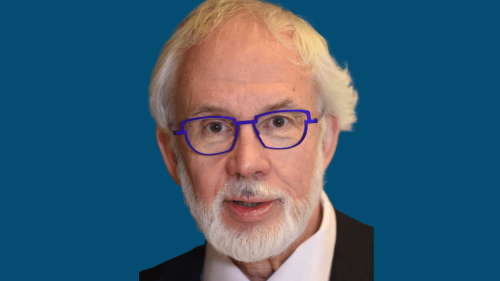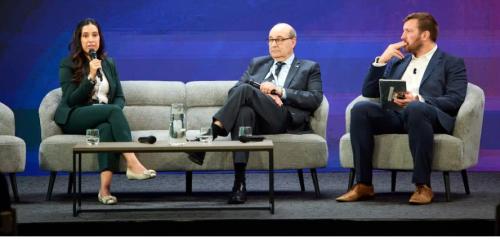What does DEI mean to you? Here at IR Impact, we’ve stopped spelling out diversity, equity and inclusion, working under the assumption that this most tricky of news items is known to all.
But it seems that other interpretations exist – on the White House official X account for example, where a post was recently put out stating ‘the only DEI we support is Deport Every Illegal’. That very much sums up the kind of narrative companies are up against with today’s very public broadly anti-ESG and specifically anti-DEI rhetoric.
It’s not just a change in the direction wind that companies are dealing with. Back when DEI was in its short-lived golden era, the question was whether or not companies should have a view, whether they should put themselves up for public scrutiny over political issues that might not have a clear material impact. Today, companies become targets whether they stick their necks out or not.
Generating a news cycle
This was something Lynn Antipas Tyson, IR lead at Ford, experienced this year. ‘We made modest changes to our 10-K and some construed it as Ford backing away from inclusion,’ she explains, stressing that ‘that is simply not true’. Still, the news cycle that was generated has stuck: if you search for ‘Ford DEI’ or ‘Ford ESG’, many hits are about the car giant stepping back from commitments in this area. This, says Tyson, makes the role of IR even more important.
‘IR needs to be armed with the facts,’ she continues. ‘Pundits are closely watching when and how companies alter their language related to DEI – IR needs to be a part of that conversation so they can speak intelligently about what is and what is not happening at their company.’
That change in wind direction can be unexpected, too: Tyson says she even has an example of where a pro-ESG proposal was seemingly hijacked for an ‘anti-woke’ purpose.
‘We had a proposal last year and the premise was child labor. We have very clear child labor requirements that we and our suppliers adhere to,’ she explains. ‘But in talking to the investor, the actual issue was our march towards electrification. The connection is the use of child labor in some countries for the mining of metals and other inputs that go into batteries.
‘On the call, I was asked: When are you companies going to stop capitulating to this woke agenda? So this issue wasn’t kids – it was a dislike of electrification. That did not garner enough votes to show up again on this year’s proxy.’
According to The Conference Board, this is unsurprising given the typically low support these proposals get – despite a ‘surge’ in submissions.
By early-April, 13 anti-DEI proposals had been filed at US public companies – a figure that, according to The Conference Board, was almost as high as across all of 2024. It added that these anti-DEI proposals also accounted for a bigger share of all DEI-related proposals: In 2024, anti-DEI proposals represented 23 percent of all DEI proposals. So far in 2025, the anti-DEI share has jumped to 40 percent.
Andrew Jones, principal researcher at The Conference Board ESG Center and co-author of a recent report on the topic, pointed out at the time that these proposals typically garner limited support: for 2024 proposals, that was typically less that 2 percent. As of April 1, support for anti-DEI proposals that had gone to vote ranged from 0.8 percent to 2.3 percent. But the proxy statement isn’t the target.
‘The main goal of these proposals isn’t to get them passed,’ says Jones, ‘but for proponents to exert influence, amplify opposition and generate media attention.’
Walking the walk
Tyson herself is a supporter of ESG: she even used her platform as a joint winner of the Best ESG reporting trophy at the IR Impact Awards – US 2025 to talk about the importance of these themes – something described by attendees as the highlight of the night.
But when it comes to the way ESG or DEI is covered from the company perspective, Tyson says it is about the facts and the continued support she sees from the investor side.
‘When it comes to DEI, the role of the IRO is in reminding the company that institutional investors overwhelmingly understand that diversity drives better results,’ she says. Tyson gathers feedback through an annual ESG non-deal roadshow, through conversations with heads of stewardship at ‘page-one holders, including index’. The outcome is clear, she says. On the index side, ‘while they can’t get involved in political debates – they are apolitical by definition – they do believe it's the role of the board to manage risk,’ she says, adding that ‘any institutional investor I talk to understands the political reality – but they are concerned that companies are going to wind up eliminating inclusion’.
All this – and other elements at play from recruitment to customer sentiment – is fed back to management and the board, with Tyson noting that she has regular board briefings and that her deck includes a slide on DEI.
‘IR is pivotal here and, as IROs, we need to make sure that in the midst of all this fervor and passion, you try to leave your political beliefs at the door,’ she advises. ‘You need to remind the company that the formation of capital is important, keeping lines of communication open with all investors is important. The board needs to understand that even if a key buy-side firm is saying it’s merging its DEI into HR for example, that doesn’t necessarily mean that they’re not going to watch how companies handle DEI and what boards look like.’
The public face of DEI…
As Tyson says, while sentiment and the day-to-day reality of DEI or ESG as a risk-management tool remains largely unchanged, the very public shifts in the policies that some big asset managers have made regarding these issues must be acknowledged.
In an exclusive look at the latest Stewardship in AQTION report from SquareWell Partners – to be published later this week – we can see that, over the past two years, 47 of the world’s largest 65 investors included board diversity expectations within their voting policies. Thirty-three of the top 65 had a policy regarding gender/racial diversity within their portfolio companies’ workforce.
But things have been changing. ‘Given the recent political backlash, particularly in the US, AQTION noted that, since 2025, investors have been stripping back policies on DEI issues,’ write the report authors. ‘Several investors have now removed references to some or all DEI expectations from their 2025 voting guidelines, including Goldman Sachs Asset Management, The Vanguard Group, Capital Group, AllianceBernstein and Charles Schwab Asset Management.
‘As more investors release their updated 2025 policies, AQTION anticipates that additional removals may follow.’
…And the internal focus
Paulina Gutierrez, another IR Impact Award winner from digital banking firm Sofi, also talks about the public and private faces of DEI – though this time on the corporate side.
‘The way that Sofi approaches DEI is twofold: There’s our external way of communicating and our internal way of talking about it,’ she notes. But Gutierrez also stresses that the company’s priorities and ethos are clear to all.
‘Our CEO, Anthony Noto, has always been very outspoken about the way that he wants to run his company,’ she continues. ‘To him, DEI is important because he truly believes that having different opinions, people from different backgrounds, different ethnicities gives you different points of view and allows you to make better business decisions.
‘All in, he believes that it’s good business practice to continue with the DEI efforts that we have in place. However, externally, it’s a finer line just because Sofi is already a very polemic stock. Anything that we say or do can bring our stock up or down 10 percent in a given day. This means we have to be very deliberate with what we do say publicly.’
DEI also isn’t a topic that comes up much on the investor side, adds Gutierrez. But as a bank – and a digital one at that – the biggest areas of focus with ESG are governance and human capital, each holding DEI potential. ‘We do think about board diversity,’ she explains, though on the broader recruitment side, ‘DEI isn’t a consideration: we hire the best person for the role.’
It is once you get into the firm that the company rolls out the welcome mats, through its SoFi Circles club system for example – where SoFi Unidos, for Latin Americans, is the biggest, with Gutierrez pointing to the bank’s ‘big presence in Latin America and the company acquisitions we’ve made down there’. Then there is SoFi Gig, what the company describes as ‘internal mobility’. This is similar to the rotational program that Tyson has previously talked about at Ford, where for example, someone in accounting at SoFi can ‘dip their toes’ in the IR water on a typically short-term project that exposes employees to new business areas while also allowing the company a better understanding of its talent base.
This, for Gutierrez – herself born and raised in Mexico – is what DEI at SoFi is about. ‘It’s not just us being nice people and a nice company. It’s a good business practice to have a diverse employee base.’
Tyson’s own interactions with the buy and sell side paint a picture that doesn’t necessarily match the increase in anti-DEI proposals or the shift away from formal requirements from investee companies – and she is weighing up the possibility of pushback on the DEI pushback next year.
‘What I wonder is whether, in proxy season 2026, there are going to be more shareholder proposals that are ESG driven, potentially because of some of what is happening in the US around regulation – or deregulation essentially. Are institutional investors going to stick their neck out and get back in the mix of saying: No, we do want diverse boards. We do care about the planet.’









